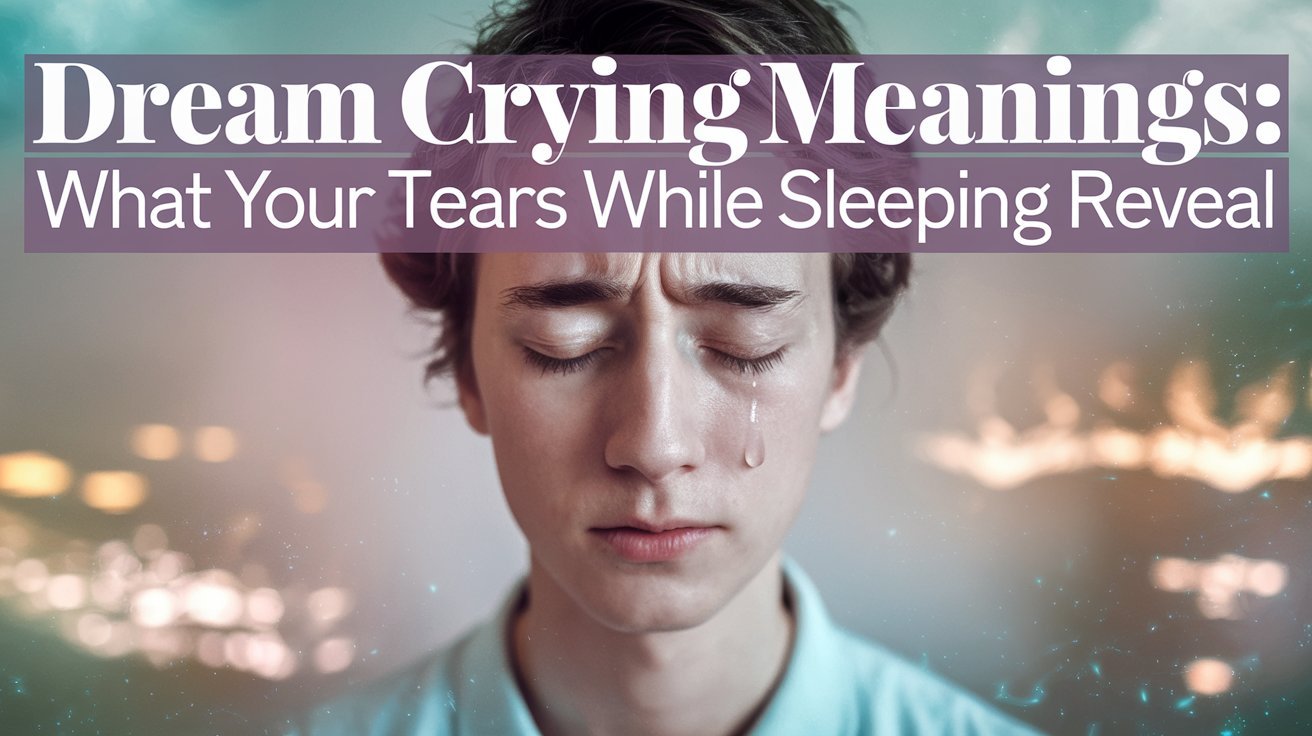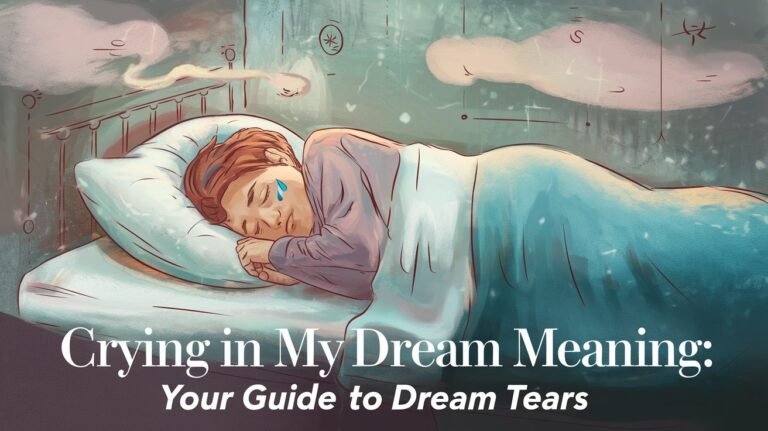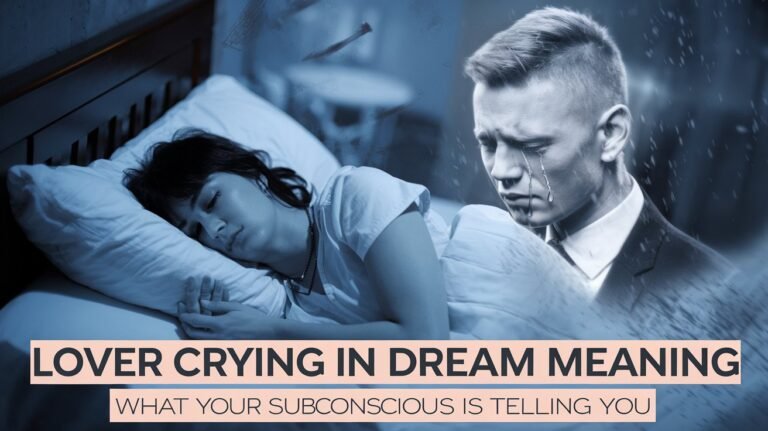Dream Crying Meanings: What Your Tears While Sleeping Reveal

Crying in your sleep can be confusing and scary. Yet, it can also reveal a lot about your subconscious mind. It shows how our dreams and daily worries can mix together. Learning about dream crying can help us understand our emotions better and our inner thoughts.
The brain works hard even when we sleep. Parts like the amygdala and cingulate gyrus are very active. This brain activity can make us cry, even if we’re dreaming. People of all ages can cry in their sleep, showing it’s a common experience.
The Science Behind Crying During Sleep
The human brain is complex and full of wonder. Its activity during sleep can explain why we cry while we sleep. As we move through sleep stages, our brain waves and activity change a lot.
Brain Activity During Sleep Stages
In the early stages of sleep, our brain waves slow down. This shows we are relaxing and less active. But when we reach REM sleep, our brain starts working again. This is when we have vivid dreams and can feel strong emotions, leading to tears.
Role of Amygdala and Cingulate Gyrus
The amygdala is a small part of the brain that links feelings to what we sense. It’s very active in REM sleep, processing our emotions and memories. The cingulate gyrus helps control our feelings and movements, like crying.
REM Sleep Connection to Emotional Expression
REM sleep is when our brain is most active, processing emotions. The amygdala and cingulate gyrus play big roles here. This can cause us to express emotions, like crying, while we sleep. It’s a way for our brain to deal with feelings and keep us healthy.
Dream Crying Meanings: What Your Tears While Sleeping Reveal
Dreams can show us deep parts of our mind. Dream crying lets us see our hidden feelings, unresolved issues, and how we deal with daily life.
Crying in dreams shows feelings of sadness, stress, or worry from our waking lives. It means our emotions are too much for us to handle calmly.
- Studies show we feel the same emotions in dreams as we do in real life, but more intensely because dreams are subconscious.
- Dream experts think crying dreams help us release hidden feelings and solve emotional problems in our lives.
- Interestingly, silent crying in a dream shows inner strength, meaning the person is working through their emotional battles.
Dreams about others crying can also mean good luck or the need to support loved ones. In some beliefs, dream crying is a way to talk to the divine, asking for help with life’s challenges.
Whether your dreams are filled with tears of joy, sorrow, or something in between, understanding dream crying can give you insights into your emotional health and hidden feelings.
Common Triggers for Nocturnal Tears
While we sleep, our brains keep working on emotions and memories. This can lead to unexpected tears. Certain things can make us cry at night, known as “dream crying” or “nighttime crying.” Knowing what triggers these tears can help us understand our subconscious better and improve our sleep.
Emotional Dreams and Memory Processing
In the rapid eye movement (REM) stage of sleep, our brain is very active. It deals with the day’s events and emotions. Emotional dreams can make us cry as our brain works through feelings or experiences we haven’t dealt with yet.
Unresolved Daily Stressors
Stress and anxiety from the day can show up in our dreams, making us cry at night. Feeling stressed about being late or unprepared for something important can cause strong emotions that come out in our dreams.
Suppressed Feelings and Emotions
Sometimes, we hold back emotions during the day. But these feelings can come out when we sleep, making us cry. This can be a way for our body to release emotions we didn’t deal with during the day.
Knowing what makes us cry at night can help us sleep better and feel emotionally better. By dealing with daily stress, working through emotions in dreams, and finding healthy ways to cope, we can reduce nighttime crying.
Night Terrors vs. Emotional Dreams
It’s key to know the difference between night terrors and emotional dreams when dealing with sleep-related crying. Night terrors happen during non-REM sleep and can cause screaming, flailing, or even sleep paralysis. Emotional dreams, on the other hand, occur during REM sleep and can make someone cry when they wake up.
Night terrors are more common in kids, with up to 56% of children aged 13 and under experiencing them. But they can also happen to adults, often those who have faced trauma. These episodes usually last from seconds to a few minutes and the person might not remember them in the morning.
Emotional dreams, though, are more common in adults. About 35-45% of adults have at least one nightmare a month. And almost all adults have had a nightmare at some point. These dreams can be so vivid that they make people cry when they wake up.
| Night Terrors | Emotional Dreams |
|---|---|
| Occur during non-REM sleep | Occur during REM sleep |
| Involve screaming, flailing, or paralysis | Can lead to tears upon waking |
| More common in children | More common in adults |
| Typically last seconds to minutes | Can be vivid and emotionally impactful |
Knowing the difference between night terrors and emotional dreams is vital. It helps in addressing sleep-related crying and managing any underlying issues like trauma, stress, or sleep disorders.
Impact of Past Trauma on Sleep Crying
Unresolved emotional trauma can greatly affect our sleep. It often shows up in disturbing dreams that cause us to cry at night. Trauma, whether direct or indirect, can mess with our brain’s emotional processing. This leaves a mark on our emotional dreams and the messages our subconscious sends us.
Processing Traumatic Experiences
Dreams are key in helping our brain deal with traumatic memories. During REM sleep, the brain tries to understand these tough experiences. This leads to emotional dreams that can make us feel strong emotions like grief, fear, and despair. This process, though healing, can be very upsetting and cause us to cry while we sleep.
Manifestation of Grief in Dreams
Loss of a loved one or big life events can show up in emotional dreams that make us cry at night. As our subconscious mind tries to make sense of grief, it uses dreams to express these deep feelings. This often results in tears during the night.
PTSD-Related Sleep Disturbances
People with post-traumatic stress disorder (PTSD) often have trouble sleeping. They might have nightmares and night terrors, leading to emotional dreams and crying at night. Studies show PTSD makes the brain’s fear centers more active and the prefrontal cortex less active. This makes trauma-related dreams more intense and hard to shake.
To tackle the issue of past trauma affecting sleep crying, we need a variety of strategies. This includes therapy that understands trauma, good sleep habits, and sometimes medical help. By grasping how trauma, dreams, and emotions are connected, we can work towards better sleep and emotional healing.
Age-Related Sleep Crying Patterns
Sleep crying patterns change with age. Infants cry a lot at night because their sleep stages are not fully developed. They also have unmet needs. As kids get older, they might cry in their sleep because of nightmares or night terrors.
Adults can cry in their sleep too. This often happens because of unresolved trauma, grief, or stress. Even older adults might cry in their sleep. This can be due to emotional trauma, grief, or conditions like Parkinson’s disease.
| Age Group | Sleep Crying Patterns |
|---|---|
| Infants | Very common due to undeveloped sleep stages and unmet needs |
| Children | Nightmares and night terrors can lead to sleep crying episodes |
| Adults | Sleep crying often linked to unresolved trauma, grief, or high stress |
| Elderly | Sleep crying may be caused by emotional trauma, grief, or medical conditions like Parkinson’s disease |
The reasons and frequency of dream interpretation and nighttime crying differ by age. Knowing these patterns helps both individuals and healthcare providers tackle sleep-related emotional issues.
Medical Conditions Linked to Sleep Crying
Crying while sleeping is not just an emotional response. It can also be linked to various medical conditions. One such condition is REM Sleep Behavior Disorder (RBD). This rare sleep disorder causes people to act out their dreams, leading to crying, shouting, or violent movements.
RBD is more common in the elderly and those with certain neurological disorders. These include Parkinson’s disease or dementia.
Sleep-Related Movement Disorders
Other sleep-related movement disorders, such as sleep paralysis, can also cause sleep crying. These disorders make a person feel trapped or unable to move during the transition between wakefulness and sleep. This can trigger intense emotions and tears.
Neurological factors, including head injuries or changes in brain waves, may also play a role in sleep crying.
Neurological Factors
Certain medications or changes in medication can also cause unusual reactions, including sleep crying. If you experience sleep paralysis tears or vivid dream emotions that lead to crying during sleep, it’s essential to discuss this with your healthcare provider. This may be an indication of an underlying medical condition that requires further evaluation and treatment.
If sleep crying occurs twice or more within a month, it’s recommended to seek medical attention. Disrupted sleep due to crying may indicate an underlying issue. It should prompt a visit to a doctor.
By understanding the medical conditions linked to sleep crying, individuals can take steps to address the problem. This can improve their overall sleep quality and emotional well-being.
Psychological Aspects of Dream Crying
Dream crying can reveal our subconscious thoughts, showing signs of anxiety, depression, or unresolved emotions. It might be a sign of hidden feelings or a way to deal with daily stress. This can influence our mood and how we function in the real world.
Emotional dreams often trigger dream crying. These dreams help us face unresolved feelings or past traumas. The strong emotions during REM sleep can cause tears, helping us release or process these feelings.
Dream crying can also hint at mental health issues. If you cry a lot in your sleep, it might mean you’re dealing with anxiety, depression, or other mental health problems. Getting professional help is key to tackling these issues and improving your well-being.
The effects of dream crying can be significant. It might mess up your sleep, making you tired and unfocused during the day. Unresolved emotions in dreams can also harm your relationships and daily life. Understanding dream crying can help you tackle the emotional and psychological issues behind it.
Physical and Emotional Signs to Monitor
Tears during REM sleep can reveal our hidden feelings and emotions. It’s normal to cry sometimes while sleeping. But, if it happens a lot, it might mean there’s something to look into.
Watch for physical signs like waking up a lot, feeling very tired, and having pains without reason. Feeling grumpy, anxious, or overwhelmed during the day could also point to sleep crying.
If you cry in your sleep and also have other sleep problems, like not sleeping well or having nightmares, see a doctor. These could be signs of a bigger issue that needs help from a professional.
| Physical Signs | Emotional Signs |
|---|---|
| Frequent sleep disruptions Persistent fatigue Unexplained aches and pains | Increased irritability Heightened anxiety Feeling overwhelmed during the day |
By noticing both physical and emotional signs of sleep crying, you can figure out what’s going on. This can help you find the right help and get better sleep.
Natural Methods to Address Sleep Crying
If you’re dealing with sleep crying often, there are natural ways to help. Start by improving your sleep habits. Stick to a regular sleep schedule and have a calming bedtime routine. Also, make sure your bedroom is cool, dark, and quiet.
Try stress-reducing activities like meditation, deep breathing, or yoga. These can help with emotional issues that might cause sleep crying.
Keeping a dream journal can also be helpful. It lets you track your dreams and any tears. This might show you what’s causing your emotional dreams. Therapy, like imagery rehearsal therapy, can help reduce nightmares and sleep crying.
For some, natural sleep aids like melatonin might be suggested. But always talk to a doctor before trying any supplements. They can help with sleep issues but should be used carefully.




